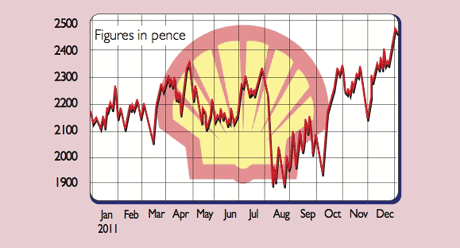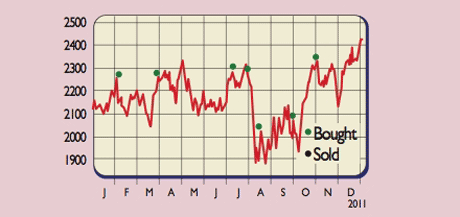Shares in focus: Oil and gas giant Royal Dutch Shell
Royal Dutch Shell is a solid business offering attractive dividends, says Phil Oakley. So should you buy it?
Get the latest financial news, insights and expert analysis from our award-winning MoneyWeek team, to help you understand what really matters when it comes to your finances.
You are now subscribed
Your newsletter sign-up was successful
Want to add more newsletters?

Twice daily
MoneyWeek
Get the latest financial news, insights and expert analysis from our award-winning MoneyWeek team, to help you understand what really matters when it comes to your finances.

Four times a week
Look After My Bills
Sign up to our free money-saving newsletter, filled with the latest news and expert advice to help you find the best tips and deals for managing your bills. Start saving today!
Royal Dutch Shell is a solid business offering attractive dividends, says Phil Oakley.
What is it?
Royal Dutch Shell is one of the world's largest oil and gas companies. The upstream division explores for and extracts crude oil and natural gas; converts gas to liquid petroleum products; and turns bitumen from tar sands into synthetic oil. It produces 3.3 million barrels of oil and gas per day and has around 14 billion barrels of proven reserves. The downstream business converts crude oil into products such as fuels, lubricants and chemicals. It operates 43,000 petrol stations worldwide.
What is its history?
The company was formed in 1907 from the merger of Shell Transport and Trading and Royal Dutch Petroleum. Major oil discoveries in California, South America and the Middle East saw it become the world's leading oil company by the late 1920s. World War II inflicted heavy damage on its assets, but the company recovered afterwards as demand for oil soared.
MoneyWeek
Subscribe to MoneyWeek today and get your first six magazine issues absolutely FREE

Sign up to Money Morning
Don't miss the latest investment and personal finances news, market analysis, plus money-saving tips with our free twice-daily newsletter
Don't miss the latest investment and personal finances news, market analysis, plus money-saving tips with our free twice-daily newsletter
However, the growing influence of politics in the oil industry saw it lose sites in Iraq and Egypt. The Arab-Israeli wars during the 1970s led Shell to diversify into coal, nuclear power and metals, but with limited success. The development of offshore oil in the North Sea and the US combined with biomass and renewable energy businesses proved to be more profitable. During the 1990s and 2000s Shell expanded into Russia and China while building a leading position in liquefied natural gas (LNG).
Who runs it?
Peter Voser has been chief executive since 2009. Prior to joining Shell, he was chief financial officer of Swiss company ABB. His basic salary is £1.5m. Ex-Nokia CEO Jorma Ollila is chairman. Simon Henry is chief financial officer.
How's trading?
With higher oil and gas prices, upstream profits rose 58% to $5.4bn in the three months to September 2011. Underlying oil and gas production rose 2% and LNG volumes grew by 12%. Downstream profits grew 25% to $1.8bn helped by better profits in the chemicals business. Underlying earnings per share rose by 40% to $1.12. The dividend stayed at $0.42 per share.

What's the outlook?
From 2012, most of Shell's production will be natural gas where long-term demand looks promising. The company has 20 new projects coming onstream during 2011-2014. The key one is a gas-to-liquids plant in Qatar, which will turn gas into products such as diesel, kerosene and paraffin. Shell also has big gas projects in North America and Australia. If oil and gas prices don't collapse, Shell's cash flow should rise and generate higher dividends.
Our view
We like Shell's rising exposure to natural gas. The company's strong finances and solid dividend prospects make it a long-term buy.
The analysts
Of the 23 analysts surveyed by Bloomberg, 15 say "buy", seven "hold" and one "sell". The average price target is 2,582p 11% above the current share price. The most bullish forecast comes from Goldman Sachs, which has a 2,890p price target. Arbuthnot Securities is the most bearish of the analysts that cover the stock, with a 1,752p target.
Directors' dealings

Apart from company share plans, there has been very little director dealing activity recently other than non-executive director Guy Elliot's purchase of £50,000 of shares in August 2011. The CEO must hold three times his annual salary in shares. Recent share activity can be seen in the chart above, with the main directors' shareholdings shown below.
Director, Shares held
P Voser, 110,694
S Henry, 117,939
M Brinded, 433,900
J Ollila, 25,000
The numbers
Stockmarket code: RDSB
Share price 2,318p
Market cap: £146.7bn
Net assets (September 2011) $166.2bn
Net debt (September 2011) $20.1bn
P/e (current year estimate) 8.4 times
Yield (prospective) 4.6%
Get the latest financial news, insights and expert analysis from our award-winning MoneyWeek team, to help you understand what really matters when it comes to your finances.
Phil spent 13 years as an investment analyst for both stockbroking and fund management companies.
-
 How should a good Catholic invest? Like the Vatican’s new stock index, it seems
How should a good Catholic invest? Like the Vatican’s new stock index, it seemsThe Vatican Bank has launched its first-ever stock index, championing companies that align with “Catholic principles”. But how well would it perform?
-
 The most single-friendly areas to buy a property
The most single-friendly areas to buy a propertyThere can be a single premium when it comes to getting on the property ladder but Zoopla has identified parts of the UK that remain affordable if you aren’t coupled-up